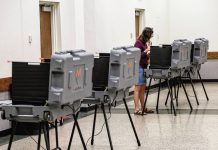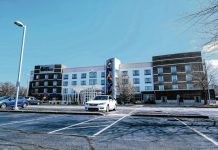Bartholomew Consolidated School Corp. has lost 469 teachers — nearly 65% of its current certified teaching staff — to retirement and resignation since 2014.
Jim Roberts, BCSC superintendent, attributes the loss of teachers to resignation to two reasons.
“You have two buckets: Stress and demand, and pay and benefits being the other,” Roberts said. “People are leaving to go to other industries, other businesses or to other school corporations that offer something different in compensation.”
It’s for the corporation’s roughly 730 teachers and 900 support staff that BCSC officials say they’re seeking about $9.3 million per year for eight years in additional property tax revenue through an operating referendum to be used to fund teacher and support staff salary increase, along with other needs.
“We see this referendum as an opportunity to address that situation,” Roberts said.
The proposed operating referendum would increase BCSC’s property taxes by $0.195 per $100 of assessed value to around $1.05 starting in 2021.
The rate increase in the proposed referendum would apply to residential, commercial, industrial and agricultural properties in BCSC’s tax district, which includes all of Bartholomew County except Flat Rock and Hawcreek Townships.
Education is only a portion of an individual’s tax bill. Property taxes are a major source of income for city, county and state governments. These taxes come from a percentage of the assessed value of a property. These government entities determine annually how much money must be allocated for providing various services required by a local community, including education, transportation, emergency, parks, recreation and libraries.
Roberts said he is unsure how the increase in the education portion would affect a property owner’s overall tax bill, but said the $.195 increase on the current $0.85 is about 23.5%. Roberts said that does not mean that an individual’s property tax will go up 23.5%.
Only a fraction of the school corporation’s budget comes from property taxes — less than one-third of BCSC’s revenue.
“A 23% increase in our property taxes revenue is about an 8% increase in our total ($117 million) budget,” said Chad Phillips, BCSC assistant superintendent. He said the corporation has never had an 8% increase in its overall budget.
Roberts said the school corporation needs the additional funds, in large part, because the level of state funding BCSC receives is not enough to be competitive when attempting to retain teachers and other staff.
BCSC will receive about $75.7 million from the state toward its education fund in 2020, which is specifically used to fund employee salaries and benefits, maintenance, supplies and other equipment. However, 97% of the education fund will support salaries and benefits. The remaining 3% will be used to fund the rest of the items.
State funding to support BCSC schools has decreased by $46 million since 2009 due to changes in the state funding formula, property tax caps, emergency state funding reductions and loss of funding from students who transfer out of the corporation, BCSC officials said.
The state has offered school corporations the opportunity to propose a local property tax referendum as an option for additional funding beyond what the state provides.
“As we consider how do we squeeze more and more dollars out of what we have to pay our teachers more appropriately and comparatively as well as our support staff, there’s not many other ways to do that,” Roberts said. “We don’t see any time soon the significant amount of dollars coming to BCSC to fund us appropriately to make the difference we need to in comparison to other school corporations.”
Around 65% of the income generated by the proposed tax increase would directly fund teacher raises, according to figures provided by BCSC officials. Roberts said teachers could see anywhere from a $5,000 to $15,000 salary increase beginning in January 2021. An exact increase, however, would not be known until the collective bargaining agreement is reached between BCSC and the Columbus Educators Association between September and November next year.
A total of 81% of the increased property tax revenue would be spent on employee recruitment and retention efforts, including salaries and benefits, 13% for student safety and security, and 6% for supplies and maintenance costs. Roberts said no dollars from the referendum would be used to fund a raise for administrator salaries.
The referendum would be maintained in a separate fund and the public would be able to confirm that the funds are invested in the ways that were advertised through the public school board meeting quarterly reports.
Student safety and security funding would center around helping retain school resource officers and mental health staff, upgrading the school bus fleet and installing a GPS tracking system that would allow parents to track their child’s school bus via a smartphone app, BCSC officials said.
For a property with an assessed value of $141,800 — the average home value in BCSC’s tax district — with homestead, supplemental and mortgage deductions, the property tax increase would be $116.84 per year, or around $9.74 per month, according to a property tax calculator on the school corporation’s website. A property assessed at a value of $300,000 could expect to see an increase of around $317.36 in property taxes per year, or around $26.45 per month.
BCSC’s current tax rate for 2019 is $0.8512 per $100 assessed valuation, which is $0.2265 less than the Indiana state average. If the proposed referendum were to make it on the ballot and was approved by voters in May, the new property tax rate would be be around $0.02 lower than the current state average of $1.077.
Property taxes that are approved by voters in a referendum are not subject to the property tax caps. Therefore, any successful referendum may result in a property bill that exceeds the caps (1% of assessed value for homesteads meaning owner-occupied residences, 2% for other residential properties and farmland, and 3% for all other property).
Phillips said replacing nearly 470 teachers in six years is unacceptable.
“To replace that percentage of professional staff, I don’t know another organization that cares about quality and outcomes and performance like we care about kids that would accept 65% of their staff being turned over in a six-year period,” Phillips said. “If we’re here six years from now talking about replacing 600 teachers in the last six years, we’ve done a disservice to the kids and to this community.”
BCSC school board member Jeff Caldwell, also a Cummins Inc. employee, said Cummins would close its doors if it lost that many employees over the course of six years.
The school board opened up a time for public comments during the board meeting Monday night. Four people signed up to speak or ask questions of the administration.
Dale Nowlin, the math department chair at Columbus North High School and Northside Middle School, said he’s lost excellent math teachers to other corporations because of salary differences. He shared with board members a story about a 15-year career teacher.
“This is a teacher who has taught for BCSC for 15 years, has a master’s degree, 15 years of experience and is an excellent teacher providing a future to a lot of students in the city,” Nowlin said. “This teacher’s school-aged kids qualify for free lunch. I would hope that is not acceptable in our community.”
The school board will vote on the corporation’s recommended referendum on Jan. 13 at 6:30 p.m. at Northside Middle School, 1400 27th St.
If the referendum is approved by the board, the school corporation will begin its campaign to encourage voters to vote yes for the referendum on the ballot May 5.
[sc:pullout-title pullout-title=”Referendum 101″ ][sc:pullout-text-begin]
The need: BCSC is seeking about $9.3 million in property taxes a year over an eight-year period through an operating referendum to be used to fund teacher and support staff salary increases, funding for student safety and security, and classroom supplies and building maintenance.
How it will be used: 81% will fund salaries to retain and recruit teachers and support staff; 13% will be invested in student safety; 6% will be used in classroom supply budgets and preventative maintenance plans for roofs and HVAC systems
How much taxes will increase: The cost to an average homeowner in BCSC’s tax district will be about $9.74 a month, or $116.84 annually for eight years, beginning in 2021.
What voters could see on the ballot: If approved by the BCSC school board in January, the following question would be placed on the May 5 ballot:
“For the eight (8) calendar years immediately following the holding of the referendum, shall Bartholomew Consolidated School Corporation impose a property tax rate that does not exceed nineteen and one half cents ($0.1950) on each one hundred dollars ($100) of assessed valuation and that is in addition to all other property taxes imposed by the School Corporation for the purpose of increasing compensation for teachers and support staff, maintaining student safety and security, and maintaining equipment and facilities?”
If the referendum fails: Without referendum funds, BCSC will consider other steps in order to retain and recruit staff. These may include higher class sizes, increased student ride time on buses, increased expenses on building maintenance items, decrease in support staff and decrease in mental health services provided.
[sc:pullout-text-end][sc:pullout-title pullout-title=”Where to learn more” ][sc:pullout-text-begin]
Bartholomew Consolidated School Corp. has created a webpage dedicated to the referendum at bcsc.k12.in.us/domain/3345.
The webpage features information about the referendum, including a frequently asked questions section and a property tax calculator. The calculator shows an illustrative impact of the proposed school operating referendum on an individual’s property tax bills based on the information entered.
For more information, contact BCSC Assistant Superintendent Chad Phillips at [email protected] or 812-378-3887.
[sc:pullout-text-end]





